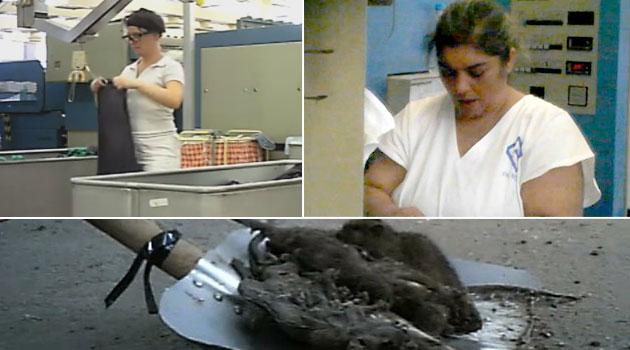Czech journalist reports on her experiences working minimum wage jobs, book and documentary film to follow

Czech journalist Saša Uhlová has gone undercover to work in the laundry room of a hospital, in a poultry processing plant, as a cashier in a supermarket chain, in a factory producing electric razors, and in a waste sorting plant. She recorded her experiences using a hidden camera and kept a journal of her time on the job.
The website a2larm.cz has now launched the first of her series of reportages about such jobs, which have minimum-wage level remuneration in common. The journalist is planning a book about her experiences and in October public broadcaster Czech Television will present a documentary film about this by Apolena Rychlíková in its “Czech Journal” program called “The Limits of Labor” (Hranice práce).
“In recent years various people have told me many stories about what they experience at their jobs. They have described receiving little pay for their labor, being forced to work overtime, having to go to work when ill, and how difficult their working conditions are. Whenever I asked whether I could quote them in what I write, they did not want to be quoted. They were afraid. A reportage full of people who are all anonymous does not seem believable. I comprehended that the only way to describe the working conditions in poorly paid jobs was to become such a worker myself. My plan, thanks to the editors at Alarm and the Fund for Independent Journalism, became a reality this year,” Uhlová writes in her opening commentary on the series of reportages.
The undercover journalist was employed full-time during her first three jobs and as a temporary worker in the others. “Leaving each job was emotionally exhausting. I did not want to abandon my colleagues, who believed I would be there permanently,” she said at a press conference about the reporting yesterday.
Uhlová also wanted to work as a seamstress, but she did not manage to find a job as one because she had no prior experience – and also because she was not certified as disabled, which is a frequent condition for being hired to do that allegedly absolutely unqualified labor. “Each day I wrote in my journal about what I had experienced at work. There were so many emotions and experiences, so much information, that I would never have managed to put it all into a reportage if I had relied just on my memory afterward. I wrote a report on each job experience, and they will begin coming out with Alarm this Wednesday. I have so much material in my journal that in addition to reportages for the website, I also want to write a book,” she said.
“There are many working people in this country who are closed up in halls without any windows, frequently in spaces where it is, moreover, either horribly cold or hot and humid, and nobody can see what they are going through. I would like to contribute, through my reportages, to making them visible,” the journalist said.